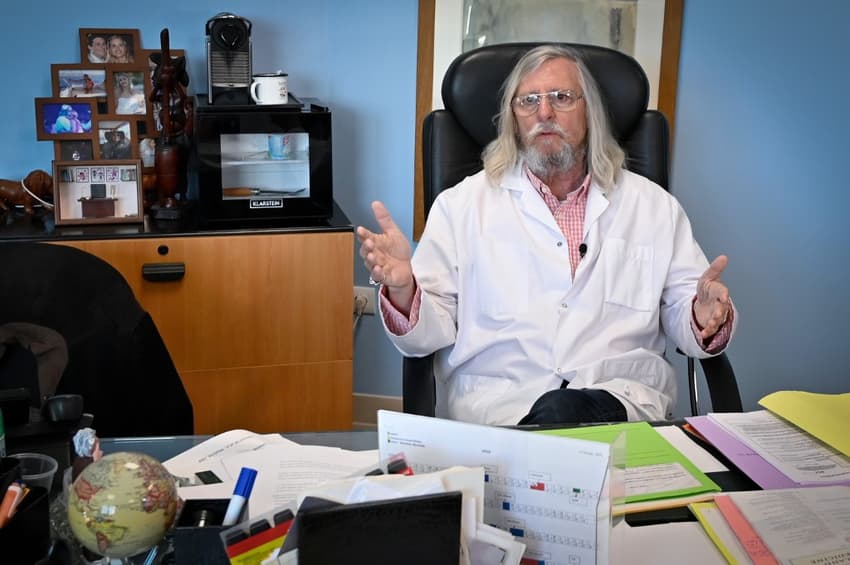Researchers in France find malaria drug has 'no positive effect' on coronavirus patients

Hydroxychloroquine - the drug heavily hyped as a Covid-19 cure and promoted by Donald Trump - had no positive effect and caused other health complications, two new studies showed Friday.
The anti-malaria drug was promoted by Marseille-based professor Didier Raoult as a wonder treatment and has been touted by US President Donald Trump among others as a potential "game changer", after initial studies in lab settings showed it may be able to prevent the virus replicating.
The drug also became a hot topic for conspiracy theorists, who claimed that the French government and pharmaceutical companies were deliberately suppressing a cheap and effective treatment.
But several subsequent studies - including one funded by the US government - appear to have doused hopes that it can help patients hospitalised with Covid-19.
In the first study released on Friday, researchers in France monitored 181 patients hospitalised with pneumonia due to Covid-19 and who needed oxygen.
Eighty-four were treated with hydroxychloroquine (HCQ) and 97 were not.
They found no meaningful difference between the groups for either transfer to intensive care, death within seven days or developing acute respiratory distress syndrome within 10 days.
"Hydroxychloroquine has received worldwide attention as a potential treatment for Covid-19 because of positive results from small studies," said the authors of the research, published in the BMJ journal.
"However, the results of this study do not support its use in patients admitted to hospital with Covid-19 who require oxygen."
A second study saw researchers in China split 150 Covid-19 patients in to two groups, one of which received HCQ.
After four weeks tests revealed similar rates of sustained infection among both groups, though adverse reactions to treatment were more common in the HCQ group.
Nor did the severity or duration of symptoms differ between each group.
Hydroxychloroquine and a related compound chloroquine have been used for decades to treat malaria, as well as the autoimmune disorders lupus and rheumatoid arthritis.
Last month the European Medicines Agency warned that there was no indication HCQ could treat COVID-19 and said some studies had seen serious and sometimes fatal heart problems in patients.
France has been running clinical trials on severely ill patients in hospitals on HCQ as well as existing drugs for the treatment of AIDS, Ebola and hepatitis.
Comments
See Also
The anti-malaria drug was promoted by Marseille-based professor Didier Raoult as a wonder treatment and has been touted by US President Donald Trump among others as a potential "game changer", after initial studies in lab settings showed it may be able to prevent the virus replicating.
The drug also became a hot topic for conspiracy theorists, who claimed that the French government and pharmaceutical companies were deliberately suppressing a cheap and effective treatment.
But several subsequent studies - including one funded by the US government - appear to have doused hopes that it can help patients hospitalised with Covid-19.
In the first study released on Friday, researchers in France monitored 181 patients hospitalised with pneumonia due to Covid-19 and who needed oxygen.
Eighty-four were treated with hydroxychloroquine (HCQ) and 97 were not.
They found no meaningful difference between the groups for either transfer to intensive care, death within seven days or developing acute respiratory distress syndrome within 10 days.
"Hydroxychloroquine has received worldwide attention as a potential treatment for Covid-19 because of positive results from small studies," said the authors of the research, published in the BMJ journal.
"However, the results of this study do not support its use in patients admitted to hospital with Covid-19 who require oxygen."
A second study saw researchers in China split 150 Covid-19 patients in to two groups, one of which received HCQ.
After four weeks tests revealed similar rates of sustained infection among both groups, though adverse reactions to treatment were more common in the HCQ group.
Nor did the severity or duration of symptoms differ between each group.
Hydroxychloroquine and a related compound chloroquine have been used for decades to treat malaria, as well as the autoimmune disorders lupus and rheumatoid arthritis.
Last month the European Medicines Agency warned that there was no indication HCQ could treat COVID-19 and said some studies had seen serious and sometimes fatal heart problems in patients.
France has been running clinical trials on severely ill patients in hospitals on HCQ as well as existing drugs for the treatment of AIDS, Ebola and hepatitis.
Join the conversation in our comments section below. Share your own views and experience and if you have a question or suggestion for our journalists then email us at [email protected].
Please keep comments civil, constructive and on topic – and make sure to read our terms of use before getting involved.
Please log in here to leave a comment.